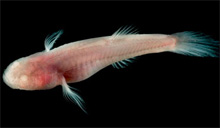A UWindsor biologist was part of a team of scientists who for the first time have discovered evidence of a fish that has gone partially deaf in order to survive.
“We were really surprised by the results,” said Dennis Higgs, who along with colleagues from Yale and the University of Maryland found that the blind, cave-dwelling amblyopsid is incapable of hearing sounds in the  mid-to-high range frequencies above 800 Hz.
mid-to-high range frequencies above 800 Hz.
Found in caves as deep as one kilometre below the surface in such states as Kentucky and Tennessee, the tiny minnow-like fish are born with eyes but lose them as they develop, leading scientists to conclude they would rely more heavily on their hearing to find mates, food and to avoid other predators.
Collaborators Matthew Niemiller at Yale and Daphne Soares at the University of Maryland brought samples of the fish to Dr. Higgs’ lab where they were tested in an acoustic chamber. They were placed in tanks where underwater sounds were played, while tiny electrodes inserted into their brains measured their neurological responses. Similar fish that live closer to the earth’s surface were able to hear higher-frequency sounds, but their blind, cave-dwelling cousins weren’t.
“We were kind of mystified,” Higgs said of the results. “They were exactly opposite of what we hypothesized. You often hear of blind people who have heightened senses so we thought that since they can’t see they’d be able to hear very well. We predicted they would have supersensitive hearing to make up for the fact that they don’t have any eyes. But the fun thing about science is when you’re wrong.”
Higgs’ colleagues went back and measured the ambient sounds in the caves and found they were much noisier than they expected. High frequency noises from flowing water, splashing, and echoes, were something akin to a dripping water torture for these fish, Higgs said. His team speculates that over time, they’ve found a way to adapt and simply don’t hear them anymore.
.jpg) “Evolutionarily, they were saying ‘Oh my God, this is so noisy it’s driving me crazy,’ so they’ve kind of become deaf to it,” said Higgs, who co-authored a paper on the subject that was published in the journal Biology Letters. “They found a way to tune it out.”
“Evolutionarily, they were saying ‘Oh my God, this is so noisy it’s driving me crazy,’ so they’ve kind of become deaf to it,” said Higgs, who co-authored a paper on the subject that was published in the journal Biology Letters. “They found a way to tune it out.”
Still being able to hear in lower ranges helps the fish avoid predators, but the scientists speculate that a greater sense of smell and touch may help them find mates and food. They plan to do more research to determine if that’s true.
“It’s really interesting because it tells us how sensory systems evolve, and what environmental factors matter in terms of driving sensory evolution,” said Higgs. “It all comes down to sensory neurobiology.”
Higgs will appear today on Research Matters, a weekly talk show that focuses on the work of University of Windsor researchers and airs every Thursday at 4:30 p.m. on CJAM 99.1 FM.

